No products in the cart.

Only Cameroon has appeared more than the Super Eagles of Nigeria at the FIFA World Cup. The Super Eagles made its debut at the 1994 edition of the World Cup, hosted in the United States.
Since its debut, the team has only failed to qualify for the tournament twice. First was the 2006 outing held in Germany, and most recently, the 2022 FIFA World Cup in Qatar.
Football pundits believe that the team’s outing at the 1994 edition of the FIFA World Cup remains its best. Marked by a team of tactical ingenuity, creative and magical footwork, and an array of brilliance on the pitch. No other Super Eagles World Cup team has come close.
Contents
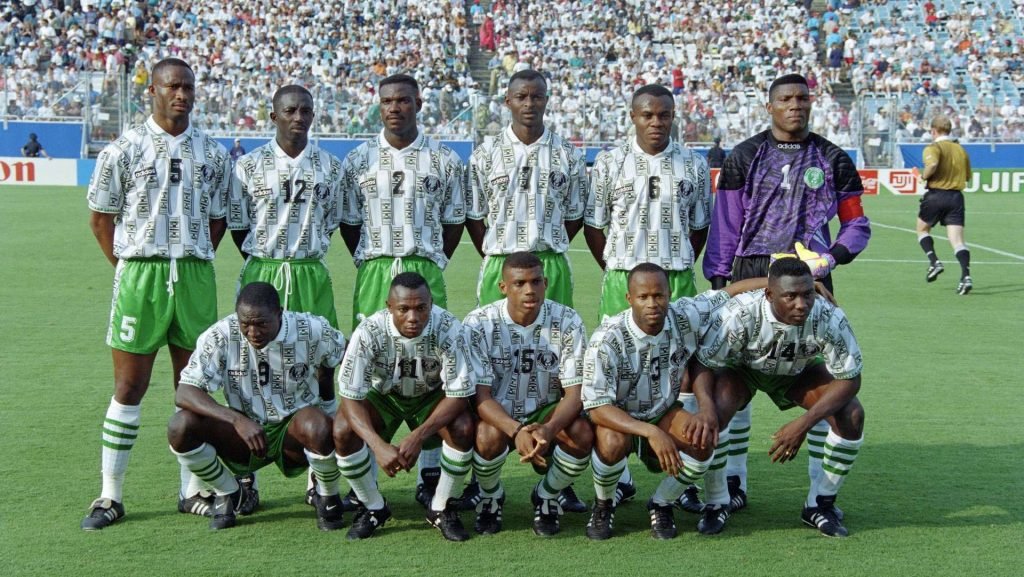
This article explores the interesting history of the Super Eagles of Nigeria at the FIFA World Cup.
1994 FIFA World Cup – United States
The Super Eagles, led by the tactical brilliance of Dutchman Clemens Westerhof, were runners-up at the 1990 edition of the African Nations Cup, losing to the host nation, Algeria. The 1992 edition of the African Nations Cup saw the team clinch the bronze medal after losing to its archrivals, Ghana in the semifinal.

The team eventually won the 1994 edition of the African Nations Cup held in Tunisia, defeating the Chipolopolo of Zambia 2-1 in the final.
By February 1994, the Super Eagles were African champions, and by April, the team was ranked 5th in the FIFA World rankings, the highest position ever by an African team. It is yet to be rivalled.
The cherry on the cake was the team’s eventual qualification for the World Cup, after seeing off Ivory Coast and Algeria. It was the first time in the nation’s history. Before its qualification, the nation had been riddled with political instability which culminated in a three-year-long Civil War.
As African champions, and at a high level in the FIFA rankings, expectations skyrocketed for the team as the nation was in high spirits.
The 1994 team comprised:
Goalkeepers: Peter Rufai, Wilfred Agbonavbare and Aloysius Agu.
Defenders: Augustine Eguavoen, Uche Ochechukwu, Chidi Nwanu, Ben Iroha and Uche Okafor.
Midfielders: Sunday Oliseh, Augustine “Jay-Jay” Okocha, Mutiu Adepoju, Efan Ekoku, Emeka Ezeugo and Thompson Oliha.
Strikers: Finidi George, Emmanuel Amunike, Samson Siasia, Rashidi Yekini and Daniel Amokachi.
The 1994 World Cup held in the United States saw the team pitted against Argentina, Bulgaria and Greece in Group D.
The Super Eagles dazzled past the Bulgarians in the first match, which was held at the Cotton Bowl Stadium, Dallas, Texas. With goals from Rashidi Yekini in the 21st minute, Daniel Amokachi in the 44th minute, and Emmanuel Amunike sealing the deal in the 56th minute, the team was off to a great start. Rashidi Yekini’s celebration of the nation’s first-ever World Cup goal became an iconic celebration.
The second match against Argentina was held at the Foxboro Stadium, Foxborough, Massachusetts. The Super Eagles went off to a flying start as Samson Siasia scored a delightful goal in the 8th minute to put the team ahead. However, the tale quickly turned around as Claudia Caniggia, adjudged to be the fastest footballer alive at the time, scored a brace in the 22nd and 29th minutes to silence the Super Eagles.
The team redeemed itself in the final match of the group stage as it defeated its Greek opponents, 2 goals to nil. The match held in the same Foxboro Stadium saw the Super Eagles clinch a much-needed victory with goals from Finidi George in the last minute of the first half, and Daniel Amokachi burying every iota of doubt in the 90th minute. The team went on to qualify for the Round of 16. Although on the same point as Argentina and Bulgaria, the team qualified as leaders with a +4-goal difference while Bulgaria came second based on a head-to-head rule, ousting Argentina from the tournament.
The Super Eagles went on to face the Italians in the Round of 16 on July 5. Popularly known as the Azurris and in possession of Golden Boy, Roberto Baggio, the Italians were one of the favourites to win the tournament. However, it did not seem so in the opening stages of the match.
The match, held in the Foxboro Stadium, saw 54,637 spectators cheer on the entertaining Super Eagles. The team took the lead in the 25th minute with a goal from Emmanuel Amunike. The team would continue to dazzle and frustrate the Italians who had to rely on cynical tactics, injuring two key players – Daniel Amokachi and goalscorer, Amunike in the 35th and 57th minutes respectively.
In the 75th minute, the Azurris went a man down as Gianfranco Zola was sent off the pitch – on his birthday.
The Super Eagles would hold on to the one-goal lead and were heading for an upset until the dying minutes of the game. Tragedy struck in the 88th minute as Golden Boy, Roberto Baggio exploited what was a sudden inexplicable loss of concentration by the Super Eagles to draw the match level. The match proceeded to Extra-Time. At the time, the Golden Goal rule was in place. This meant that any team who scored first in the extra time won the match.
In the 102nd minute of the game, Roberto Baggio would put a penalty past the Super Eagles’ net, scoring the match-winning goal after what was unnecessary wrestling down of Antonio Bennarivo by Augustine Eguavoen.
The match ended the team’s dream of clinching the most coveted trophy, and also Clemens Westerhof’s six-year stint as the gaffer of the team.
The Italians went on to clinch the second position in the tournament, while Bulgaria proceeded to the semifinals of the tournament.
Despite losing out in the Round of 16, the Super Eagles were adjudged the most entertaining team of the 1994 FIFA World Cup.
1998 FIFA World Cup – France
Following what was a successful first outing at the 1994 edition of the FIFA World Cup, the Super Eagles returned to the tournament in 1998. As was the case at the previous World Cup in the United States, expectations were high and the hopes of surpassing the previous performance were equally high.
Philippe Troussier who had earlier qualified the team for the second outing was axed and shown the exit door. A “world-class coach” in Bora Milutinovic was hired a few months before the World Cup finals in France.
Milutinovic retained most of the players in the 1994 squad with new additions joining the squad.
Goalkeepers: Abiodun Baruwa and William Okpara.
Defenders: Celestine Babayaro, Taribo West and Mobi Oparaku.
Midfielders: Garba Lawal and Wilson Oruma.
Strikers: Tijani Babangida and Nwankwo Kanu.
The team was again drawn in Group D, this time against European powerhouse, Spain, Bulgaria (second consecutive time), and Paraguay.
The group’s top seed, Spain, was expected to dominate the group but this was not the case. They suffered the ignominy of an early exit in the group stages.
The Super Eagles faced the Spaniards in their opening encounter. The match thrilled the spectators to no end. The Super Eagles trailed the Spaniards twice before Sunday Oliseh struck a 25-yard wonder strike past Spain’s goalkeeper, Andoni Zubizarreta, to secure a 3-2 victory for the team. Goals by Mutiu Adepoju, an own goal by Zubizaretta, and Oliseh’s stunner sealed the victory for the Super Eagles at the Stade de la Beaujoire in Nantes.

The Super Eagles would face the Bulgarians for a second consecutive time at the Mundial. As was the case at the previous World Cup, the Super Eagles edged the Bulgarians, this time with a lone goal at the Parc des Princes in Paris. The goal was scored by Victor Ikpeba in the 27th minute.
The team, already through to the Round of 16, faced Paraguay in an unimportant match at the Stadium Municipal. The team was defeated 3-1 with Wilson Oruma scoring the only goal of the team in the 11th minute.
Milutinovic’s tactical brilliance was called to question in the Round of 16 as the team was walloped 4-1 by Denmark at the Stade de France in Saint-Denis. The Super Eagles were walked over by the Danes in what was an abysmal performance by the team. Tijani Babangida only managed a consolation goal in the 78th minute.
The brilliance of Jay-Jay Okocha at the World Cup, however, made him stand out. He dazzled the fans with an array of tricks and magical footwork. His impeccable passes, dribbling and showboating were second to none.
Despite falling short in the tournament, Okocha was named among the six reserves of the All-Star Team of the tournament, alongside Edwin van der Sar of the Netherlands, Juan Sebastian Veron of Argentina, Christian Vieri of Italy, Michael Owen of England and Thierry Henry of France.
The 1998 FIFA World Cup was termed a disappointment as opposed to the 1994 World Cup where the Super Eagles were only minutes away from qualifying for the quarter-finals.
France went on to win the trophy on home soil after defeating Brazil by 3 goals to nil.
2002 FIFA World Cup – Korea/Japan
As opposed to the 1990s, the early 2000s was not a great period in the history of the nation’s football. Bonfrere Jo was sacked as coach of the team and the duo of Shuaibu Amodu and Stephen Keshi were brought in for a rescue mission. The pair qualified the team for the World Cup but lost to Senegal in the semifinals of the 2002 Nations Cup in Mali.
As a result, they were once again axed by the NFF and Adegboye Onigbinde was called upon to lead the team. As a result, players like Sunday Oliseh and Finidi George were dropped from the squad. The 2002 World Cup was hosted by two Asian nations – South Korea and Japan. It was tagged Korea-Japan 2002.
New entries made it to the Nigerian team. These included:
Goalkeepers: Austin Ejide, Vincent Enyeama and Ike Shorunmu;
Defenders: Rabiu Afolabi, Eric Ejiofor, Isaac Okonkwo, Efe Sodje, Ifeanyi Udeze and Joseph Yobo;
Midfielders: Justice Christopher and James Obiorah;
Strikers: Julius Agahowa, Benedict Ikwegbu, Pius Ikedia, Bartholomew Ogbeche, John Utaka and Femi Opabunmi.
Having dropped Sunday Oliseh from the squad, Austin Jay-Jay Okocha became the new captain of the Super Eagles and led the team.
Nigeria put up an abysmal performance. A woeful display at its best. The team lost their first two matches and played out a stalemate in the last match.
Argentina edged the team in the opening encounter with a lone goal by Gabriel Batistuta in the 63rd minute.
Julius Agahowa scored a header in the second match against Sweden in the 27th minute before Henrik Larsson scored his brace from the penalty spot in the 63rd minute to knock out the team from the tournament.
The team would play out a goalless draw against England in the last match of the group stages. An end to a display of brilliant nonsense.
Brazil would go on to win the tournament, edging out Oliver Kahn’s Germany in the finals after a superb display of quality football by the Samba boys and even more so, Ronaldo de Lima.
2006 FIFA World Cup – Germany
The abysmal run of performances would continue into the next edition of the World Cup. The Super Eagles failed to qualify for the 2006 edition of the FIFA World Cup held in Germany. The team drew level on points with Angola in the qualifiers but lost out on head-to-head records.
Italy went on to win the tournament for the fourth time via a penalty shoot-out, following what was a feisty encounter between the Azurris and the Les Blues of France.
2010 FIFA World Cup – South Africa
The year 2010 was again a case of rinse and repeat for the Super Eagles of Nigeria. Following a third-place finish at the Africa Nations Cup in February, Shuaibu Amodu was once again axed as the coach of the team, the second time he would suffer such a fate.
Former Sweden Coach, Lars Lagerback was appointed as coach barely five months before the World Cup finals in South Africa. It was the first time an African nation would host the Mundial and expectations were high.
The team was drawn against Argentina, Greece and South Korea in what was an almost repetitive venture of the 1994 World Cup.
The squad comprised:
Goalkeepers: Vincent Enyeama, Austin Ejide and Dele Aiyenugba.
Defenders: Joseph Yobo, Danny Shittu, Rabiu Afolabi, Chidi Odia, Dele Adeleye, Taye Taiwo and Elderson Echiejile.
Midfielders: Sani Kaita, Yusuf Ayila, Lukman Haruna, Brown Ideye, Kalu Uche and Dickson Etuhu.
Strikers: Nwankwo Kanu, Yakubu Aiyegbeni, Peter Osaze Odemwinge, John Utaka, Obafemi Martins, Victor Obinna and Chinedu Obasi.
Each match of the group stage in this outing had an infamous moment.
The first match against Argentina held at the Ellis Park Stadium, Johannesburg, saw the team lose 1-nil to Argentina after an early goal by Gabriel Heinze in the 6th minute. Vincent Enyeama kept the Argentines at bay and even more so the World’s Best Player at the time, Lionel Messi. Enyeama put in a brilliant display of shot stops, denying the prolific player a goal.
The team faced Greece in the second match in the Free State Stadium, Bloemfontein. The team went ahead in the 16th minute, courtesy of a goal from Kalu Uche, and things appeared to be going smoothly for the Super Eagles.
The 33rd minute however witnessed a turn of events as Sani Kaita was sent off following an unprovoked delivery of a glancing stamp on the thigh of Greek defender, Vasilis Torosidis. This would prove costly for the Super Eagles.
The team suffered afterwards, as the Greeks equalised in the 44th minute through Salpingidis. Torosidis would himself deliver the eventual blow in the 71st minute as he scored the winner, pouncing on an Enyeama error with only 19 minutes left to play.
Despite having lost the first two matches, the Super Eagles had a chance to qualify for the Round of 16, provided they could pull off a win against the South Koreans in the final group game.
Another infamous moment would ensue in the match.
The match which took place at the Moses Mabhida Stadium in Durban, saw the Super Eagles take the lead in the 12th minute following a goal from Kalu Uche, the second time in two matches.
However, the Asians would score in either side of the half, with goals from J. Lee in the 38th minute and C. Park in the 49th minute.
Then came the infamous moment. Nigeria’s forward, Yakubu Aiyegbeni failed to convert an open goal cross in the six-yard box.
Aiyegbeni redeemed himself in the 69th minute after converting a spot kick but a draw was not enough to see the team through to the next round.
The team bowed out in the group stages. Lars Lagerback was heavily criticised and he turned in his resignation letter afterwards. Nigerians never forgave Kaita and Aiyegbeni, and it was the last one would ever hear from them in the national team.
Following the exit of the team, President Goodluck Ebele Jonathan suspended the team from representing the country for two years. FIFA would eventually ban the team as a result of political interference. However, the ban was rescinded.
Spain went on to win the tournament, following a beautiful goal by Andres Iniesta against the Netherlands.
2014 FIFA World Cup – Brazil
The 2014 edition of the FIFA World Cup was met with so much glee and joy as the Super Eagles had been crowned African champions the previous year. Following the team’s success at the African Nations Cup, and eventual qualification for the World Cup, hopes were high, and the team was expected to perform excellently at the Mundial.
Stephen Keshi had led the team to its third trophy at the 2013 edition and was in the dugout for the World Cup.
The squad had several home-based players.
Goalkeepers: Vincent Enyeama, Austin Ejide and Chigozie Agbim;
Defenders: Joseph Yobo, Kenneth Omeruo, Godfrey Oboabona, Juwon Oshaniwa, Kunle Odunlami, Azubuike Egwuekwe and Efe Ambrose;
Midfielders: John Mikel Obi, Ejike Uzoenyi, Reuben Gabriel, Victor Moses, Ogenyi Onazi, Ramon Azeez and Michael Babatunde;
Strikers: Shola Ameobi, Uche Nwofor, Michael Uchebo, Emmanuel Emenike, Peter Osaze Odemwingie and Ahmed Musa.
The team was drawn in Group F against Iran, Bosnia and Herzegovina and for the fourth time, Argentina.
The Super Eagles played out a goalless draw against Iran in their opening match. The match, held at the Arena da Baixada in Curitiba, saw the Eagles dominate possession but were unable to convert their chances.
The second match against Bosnia and Herzegovina proved more difficult as the team were outplayed by their opponents, despite having the same number of shots. However, the team held on to a one-goal victory, courtesy of Peter Odemwingie’s goal in the 29th minute.
The third match against Argentina, held in the Estadio Jose Pinheiro Borda in Porto Alegre proved to be much more feisty, dramatic and entertaining.
Lionel Messi faced Vincent Enyeama once again, and this time, proved himself worthy. He scored the first goal of the encounter in the 3rd minute only to be replied immediately by the brilliance of Ahmed Musa in the 4th minute.
Lionel Messi scored his brace in the dying minutes of the first half with Argentina taking the lead into the second half.
Ahmed Musa was not done yet. Two minutes into the second half, he scored a beautiful goal to the delight of Nigerians all over the world and drew the team level.
Unfortunately, Marcus Rojo, Argentina’s defender scored in the 50th minute to put the match past the Super Eagles.
Both teams qualified for the Round of 16.
Nigeria faced Les Blues of France at the Estadio Nacional de Brasilia in Brasilia. The team put up a brilliant performance in the first half, keeping the European giants at bay. Ogenyi Onazi was a wonder to behold in the midfield. He was exceptional on and off the ball. Having been marked as the danger man, he was injured by Blaise Matuidi minutes after the French man came onto the pitch. The Super Eagles never recovered from the loss of the midfielder.
Paul Pogba scored the first goal in the 79th minute to give the French team the lead. Joseph Yobo scored an own goal in the dying minutes of the second half to end the run of the Super Eagles at the World Cup.
Argentina eventually went on to face Germany in the final. Germany had earlier demolished the host, Brazil, 7-1 in what was a humiliating semi-final match for the host nation. Mario Gotze scored the only goal in extra time, securing the trophy for the Germans.
2018 FIFA World Cup – Russia
The team was led by Gernot Rohr to the 2018 edition of the World Cup held in Russia. The team had clinched the bronze medal at the African Nations Cup and was tipped to perform brilliantly at the tournament.
The squad was made up of:
Goalkeepers: Ikechukwu Ezenwa, Francis Uzoho and Daniel Akpeyi.

Defenders: Abdullahi Shehu, Tyronne Ebuehi, Elderson Echiejile, Bryan Idowu, Chigozie Awaziem, William Ekong, Leon Balogun and Kenneth Omeruo.
Midfielders: John Obi Mikel, Ogenyi Onazi, Wilfred Ndidi, Oghenekaro Etebo, John Ogu, and Joel Obi.
Strikers: Ahmed Musa, Kelechi Iheanacho, Victor Moses, Odion Ighalo, Alex Iwobi, and Simeon Nwankwo.
The team was drawn in Group D against Croatia, Iceland and arch-nemesis, Argentina.
The team caused an uproar with its colourful jersey, designed by NIKE. The jersey which sold out minutes after its unveiling was the most colourful at the tournament. However, unlike its bright and colourful jersey, the team failed to put up a colourful performance as they bowed out of the tournament in the group stages.
An own goal from Oghenekaro Etebo in the 32nd minute and a spot kick converted by Luka Modric in the 71st minute saw the Croatians cruise to a two-goal victory in the opening encounter of the group stages.
The team redeemed itself in the second match with Ahmed Musa dazzling and lifting the hearts of Nigerians once again. He scored a brace in the 49th and 75th minute against Iceland and the team secured all three points.
This gave the nation hope as they faced archrivals, and nemesis, Argentina.
Lionel Messi once again dazzled, and in the 14th minute, put a goal past Francis Uzoho. The Super Eagles held the Argentines and Victor Moses converted a spot kick in the 51st minute.
Unfortunately, Marcus Rojo, the defender who scored the winner in the 2014 edition would once again rise to the occasion. He netted the winner in the 86th minute, shattering the hearts of football-loving Nigerians all over the world.
Croatia went on to face eventual champions, France in the finals. They were defeated by 4 goals to 2.
2022 FIFA World Cup – Qatar
The Super Eagles failed to qualify for the World Cup for the second time after a successive run of three appearances at the global football showpiece. The team was edged out by arch-rivals, Ghana in the qualifiers on an away goal basis after being held to a one-all draw at the National Stadium, Abuja.
The failure did not go down well with the citizens of the country as fans took to the stadium after the match and demolished the newly renovated infrastructure.
The 2022 FIFA World Cup is set to hold in Qatar from November 20 to December 18, 2022.
We always have more stories to tell. So, make sure you are subscribed to our YouTube Channel and have pressed the bell button to receive notifications for interesting historical videos. Also, don’t hesitate to follow us on all our social media handles and to as well share this article with your friends.
Feel free to join our YouTube membership to enjoy awesome perks. More details here…
Sources
Eludini, T. (2021). Remembering Nigeria’s AFCON 1994 Super Squad. Premium Times. Retrieved from https://www.premiumtimesng.com/news/headlines/468104-remembering-nigerias-afcon-1994-super-squad.html
Lin, B. (2014). World Cup History: Nigeria. Forza Italian Football. Retrieved from https://forzaitalianfootball.com/2014/06/nigerias-world-cup-history/
Mba, N. (2019). A brief history of Nigeria’s performance at the FIFA World Cup. Sportskeeda. Retrieved from https://www.sportskeeda.com/nigerian-football/a-brief-history-of-nigeria-s-performance-at-the-fifa-world-cup
Nnabuogor, I. (2022). Did Westerhof lose Nigeria the 1994 World Cup? Score Nigeria. Retrieved from https://scorenigeria.com.ng/did-westerhof-lose-nigeria-the-1994-world-cup/
Nnachetta, T. (2018). The Class of ’94: The historic World Cup debut. Vanguard. Retrieved from https://www.vanguardngr.com/2018/06/class-94-historic-world-cup-debut/
Oludare, S. (2021). “Nigeria had all the ‘ingredients’ to win the World Cup” – Oliseh. Retrieved from Goal. https://www.goal.com/en-ug/news/nigeria-had-all-the-ingredients-to-win-the-1994-world-cup/kdj3kw0eg2v91ltxjgfbtxthj
Omidiora, S. (2020). Remembering Okocha at the 1998 World Cup. Goal. Retrieved from https://www.goal.com/en-ng/news/remembering-okocha-at-the-1998-world-cup/1bgvipv3r52rb12nds6nspb34l
Panja, T. (2022). Tallying the Costs, Shirts and All, of Missing the World Cup. New York Times. Retrieved from https://www.nytimes.com/2022/06/02/sports/soccer/nigeria-ecuador-world-cup.html
Premium Times. (2017). THROWBACK: Recalling Nigeria’s historic World Cup debut. Premium Times. Retrieved from https://www.premiumtimesng.com/sports/sports-features/227165-throwback-recalling-nigerias-historic-world-cup-debut.html
Tyers, A. (2018). Nigeria World Cup 2018 Squad list and team guide. Telegraph. Retrieved from https://www.telegraph.co.uk/world-cup/0/nigeria-world-cup-2018-squad-list-team-guide/
Leave a Reply
You must be logged in to post a comment.

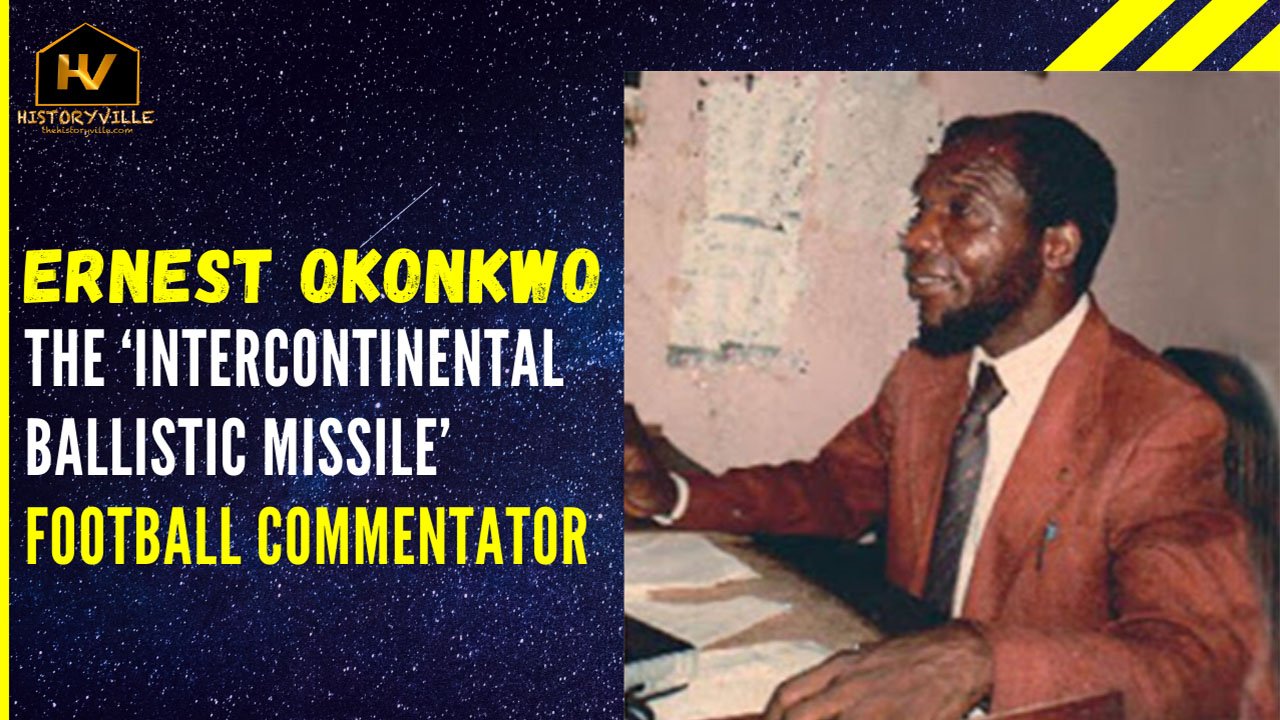
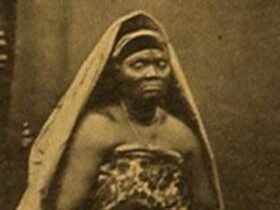
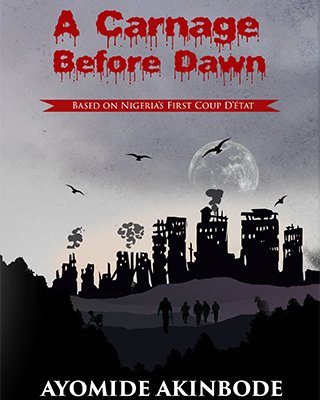


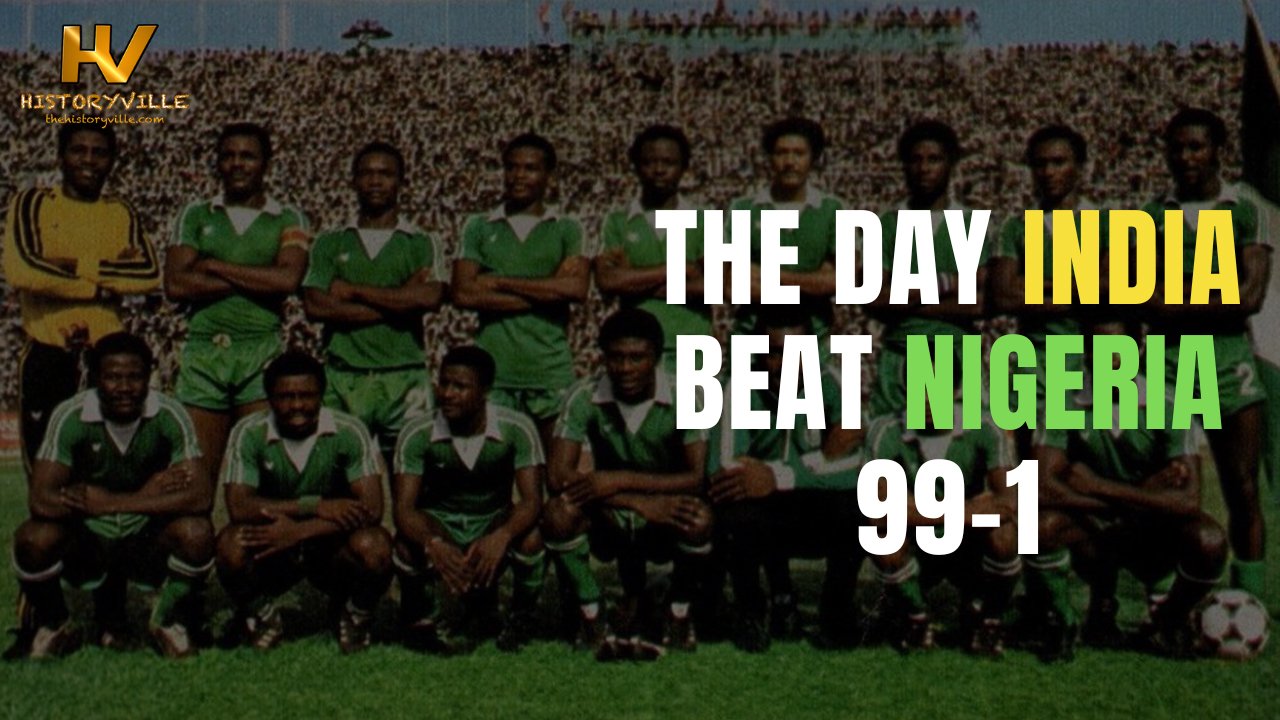
Leave a Reply
View Comments